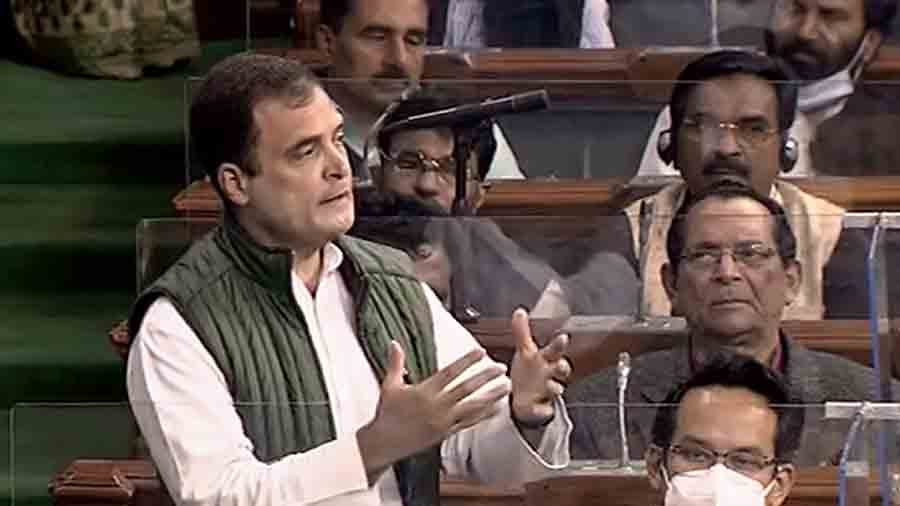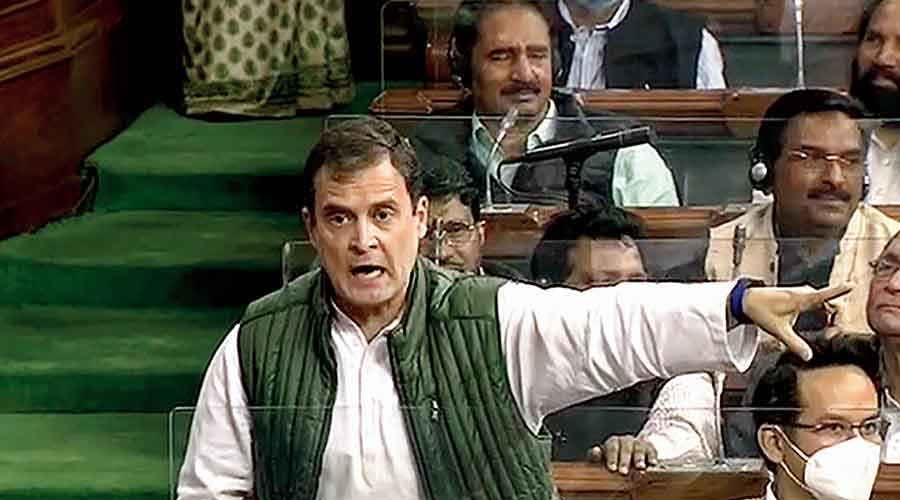The BJP continued to attack Rahul Gandhi on Thursday over his speech in Parliament, with Union minister Kiren Rijiju saying the Congress leader is used to behave like India's "yuvraj" and now thinks that he is its king.
BJP vice president Baijayant Jay Panda mocked him saying that the "king of comedy is increasingly turning out to also be the prince of darkness".
"Yes, of course the Constitution defines India as a union of states. No issue there, but to extrapolate from that to say India is 'not a nation' is not merely ludicrous, but downright sinister," he said.
Gandhi had on Wednesday said the Congress smashed the idea of a king in 1947, but now it has come back and the ruling dispensation had created two Indias -- one for the poor and the other for the rich.
Rijiju retorted to it saying that there was indeed two Indias and one of them includes those who go on foreign trips and rave parties.
"Two Indias are 1. People enjoy high-class society life, attend rave parties, frequent vacation trip to foreign destinations and enjoy a very colourful life. 2. People live a simple life in India, remain with the needy people all the time, think Indian and follow Indian traditions," he said in a tweet.
The Law Minister added, "Earlier he used to behave like India's Yuvraj' and now he thinks he is the King' of India!"
BJP spokesperson and Bihar government minister Shahnawaz Hussain also targeted Gandhi.
"Rahul Gandhi says that we have made huge strategic mistakes in J&K and in our foreign policy. Is he saying that going after terrorists and lifting of article 370 is a wrong policy? Why does he support the propaganda of Pakistan?" he said.
Speaking first from the Opposition side in Lok Sabha during the debate on the Motion of Thanks on the President's address, he said that the government's stand on China and Pakistan worked only to bring the two neighbouring countries together to work against India.
Privilege motion moved against Rahul
Bharatiya Janata Party (BJP) lawmaker Nishikant Dubey on Thursday moved a breach of privilege motion against Rahul Gandhi for “inciting” people through the speech that the Congress leader made in Parliament on Wednesday slamming the government for allegedly destroying the idea of India by ruling a union of states as a “kingdom”., according to hindustantimes.com.
Instead of a “Union of States” that converses and negotiates with its citizens, “the idea of the king has come back. A shahenshah, a master”, Rahul told the House during the debate on the motion of thanks to the President’s address on Wednesday.
Dubey called Gandhi “script reader” and a “drawing-room politician” and added he has not even read the Preamble of the Constitution, which states: “We, the People of India, having solemnly resolved to constitute India into a Sovereign Socialist, Secular, Democratic Republic.” He added by the usage of the word Republic in the preamble, it has been made clear that India is a nation by all means. “But it is quite unfortunate that this simple fact is not understood by a veteran Parliamentarian... Rahul Gandhi,” Dubey said in his notice.
Frequently interrupted by the treasury benches but maintaining his composure, the Congress MP focused on painstakingly explaining how the RSS-BJP’s divisive politics weakened India. So incensed was the Modi government that it later sought an apology from Rahul for his remarks on the judiciary and the Election Commission.
He added Gandhi misinterpreted the Constitution and put out “wrong and illogical facts before the country with the sole intention of inciting the people at large to enter into some sort of subversive activities against our Country.” He added this is a breach of privilege and contempt of the House and thus punishable under the rules. Dubey said Gandhi’s speech was an attempt to “hint” and “incite” other lawmakers and also the citizens.
According to Parliamentary rules, if individuals or authorities violate or disregard any of the privileges, powers, and immunities of the House or members or committees thereof, they are liable for punishment for breach of privilege or contempt of the House.
The House has the power to determine what constitutes the breach of privilege and contempt. The penal jurisdiction of the House in this regard covers its members as well as strangers and every act of violation of privileges, whether committed in the immediate presence of the House or outside of it. A person found guilty of breach of privilege or contempt of the House “may be punished either by imprisonment, or by admonition (warning), or reprimand”, according to chapter 16 of Rajya Sabha rulebook. Suspension and expulsion from the House are other punishments that may also be awarded to the members for contempt.












